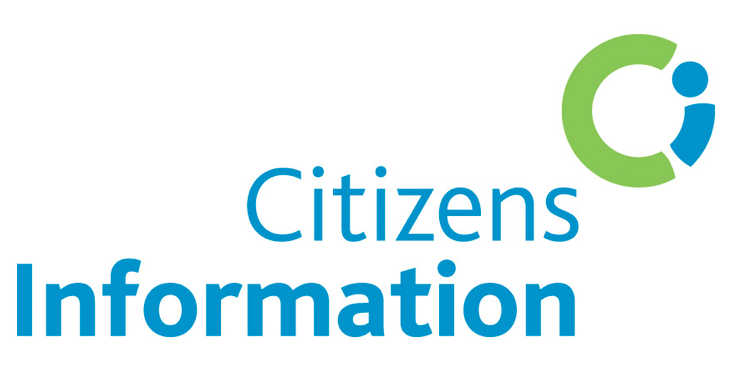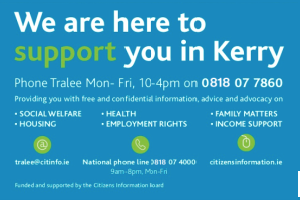
.
 Know Your Rights has been compiled by Kerry Citizens Information Service which provides a free and confidential service to the public…
Know Your Rights has been compiled by Kerry Citizens Information Service which provides a free and confidential service to the public…
What are tips, gratuities and service charges?
Tipping is mainly associated with the hospitality sector. It is also common among other services such as taxi drivers, hairdressers, tour guides and delivery drivers.
Employees usually get tips from customers through one of the following types of payment:
• Mandatory service charge
• Discretionary service charge
• Tip or gratuity paid to the employer by credit or debit card
• Tip or gratuity paid into a communal pool, for example a staff box or similar
• Tip or gratuity handed directly to the employee
The Payment of Wages (Amendment) (Tips and Gratuities) Act 2022 became law on 20 July 2022. It introduces new rules about how employers share tips, gratuities, and service charges amongst employees. The Act comes into effect on 1 December 2022.
Continued below…
What is a mandatory service charge?
A ‘mandatory service charge’ is a payment that a customer must pay for certain goods or services, in addition to the cost of the goods or services.
What is a tip or gratuity?
A ‘tip or gratuity’ is a payment made by a customer which they assumed would be kept by the employee or shared with other employees.
It is either:
• Voluntarily made to, or left for an employee of group of employees
• Voluntarily made to an employer
What are the new rules on tips and gratuities and service charges?
The Payment of Wages (Amendment) (Tips and Gratuities) Act 2022 comes into effect on 1 December 2022.
The Act, introduces new rules about how employers share tips, gratuities and service charges amongst employees. It also makes it illegal for employers to use tips or gratuities to make up basic wages.
The legislation will be reviewed after one year to assess its effectiveness and decide if further measures are needed.
Continued below…
Restrictions on the use of ‘service charges’
Voluntary service charges are the same as a tip or a gratuity. Mandatory service charges are charges that must be paid by the customer, on top of the cost of the product or service.
Employers are banned from describing a mandatory service charge applied to a customer’s bill as a ‘service charge’ unless the payment is treated by the employer in the same way as electronic tips or gratuities.
This means that mandatory service charges can only be added to a bill if the money goes to employees.
What are the rules on how tips or gratuities must be distributed?
All employees must be consulted on the policy introduced on how tips or gratuities will be distributed. Employers must also consult with employees before making a material change to the policy.
Electronic tips & cash tips received by the employer must be distributed fairly and in a transparent way.
Employers can consider certain factors when deciding how to distribute tips, including:
• Seniority or experience
• The value of sales or revenue generated
• The number of hours worked
• Whether the worker is on a full-time or part-time contract
• The worker’s role in service delivery
Your employer must give you a statement of the tips and gratuities distributed, including the total amount of electronic tips received during a particular period and how much was paid to you. You must get this statement within 10 days of the tips and gratuities being distributed.
Cash tips are often paid directly to the worker. If these tips are managed by employees themselves, for example under a ‘tronc’ system, the distribution rules above do not apply.
However, employers must set out how cash tips are distributed in its publicly displayed Tips and Gratuities Notice’
Continued below…
What us the requirement to display a ‘Tips and Gratuities Notice’
Customers have the right to know what service charges are used for and who they go to.
From 1 December 2022, employers must clearly display their policy on how cash and card tips, gratuities and service charges are distributed.
The ‘Tips and Gratuities Notice’ must clearly state:
Whether or not tips or gratuities are distributed to and among staff
The way they are distributed and the amounts distributed
Whether or not service charges (or any portion of them) are distributed and if so, how they are distributed and amounts distributed
How are the rules re tips & gratuities enforced?
All electronic tips received by the employer must be distributed fairly and in a transparent way.
This will be inspected through the Workplace Relations Commission (WRC).
The Workplace Relations Commission (WRC) can order an employer to reimburse any unlawful tip or gratuity deductions.
How to make a complaint?
If you are not getting the tips you are due, you should speak with your employer first.
If you cannot resolve the problem with your employer, you can complete the online complaint form on workplacerelations.ie.
You must make your complaint within 6 months of the dispute or complaint occurring. This time limit may be extended for a further 6 months, but only where there is a reasonable cause which prevented you from bringing the complaint within the normal time limit.
• For anyone needing information, advice or have an advocacy issue, you can call a member of the local Citizens Information team in Kerry on 0818 07 7860, they will be happy to assist and make an appointment if necessary.
The offices are staffed from Monday to Friday from 10am to 4pm. Alternatively you can email on tralee@citinfo.ie or log on to www.citizensinformation.ie for further information.
……………………………………………………………………………………………………………………………………………………………………………………………………………………………………………………………………………………………………………………………………………………………………………………………………………………………………………………………………………………………………………………………………………………………………………………….















